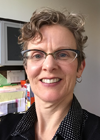Sponsored by Grantmakers in Aging
Includes complimentary CEUs*
.jpg) The FrameWorks Institute conducted a national multi-year project with leading aging organizations to identify the way members of the public think and talk about aging. Join us as we continue the exploration of the Reframing Aging Project and take a deeper review of the evidence-based strategies developed from this research for communicating more effectively about aging-related issues. Learn how to frame your messages and what cues to avoid to help people think more like experts do about ageism, demographic change, elder abuse and other policy issues.
The FrameWorks Institute conducted a national multi-year project with leading aging organizations to identify the way members of the public think and talk about aging. Join us as we continue the exploration of the Reframing Aging Project and take a deeper review of the evidence-based strategies developed from this research for communicating more effectively about aging-related issues. Learn how to frame your messages and what cues to avoid to help people think more like experts do about ageism, demographic change, elder abuse and other policy issues.
This web seminar is a follow-up to Reframing Aging: Research-Based Messaging Strategies for Aging Advocates and Communicators held on April 26, 2018. To view the recording, click here.
Participants in this web seminar will be able to:
- Describe framing, what it means to frame/reframe, and framing traps to avoid;
- Identify communication cues that may activate unproductive and productive thinking;
- Describe evidence-based communication strategies to tell a more effective story about your work on aging issues; and
- Identify additional resources and tools to take the next steps to change communication within your organization.
Presenters:
 Krista Brown is Director of Education at ASA and recently completed the Frameworks Institute Reframing Aging Master Trainer Workshop.
Krista Brown is Director of Education at ASA and recently completed the Frameworks Institute Reframing Aging Master Trainer Workshop.
.jpg) Karen Kolb Flude, MS, RFG is Principal at Age with Ease and serves on the ASA Board. She recently completed the Frameworks Institute Reframing Aging Master Trainer Workshop.
Karen Kolb Flude, MS, RFG is Principal at Age with Ease and serves on the ASA Board. She recently completed the Frameworks Institute Reframing Aging Master Trainer Workshop.
The Reframing Aging Project is an initiative by the Leaders of Aging Organizations, which includes the American Society on Aging, AARP, the American Federation for Aging Research, the American Geriatrics Society, the Gerontological Society of America, Grantmakers in Aging, the National Council on Aging, and the National Hispanic Council on Aging.
Together they represent and have direct access to millions of older adults and thousands of individuals working in aging-related professions.

